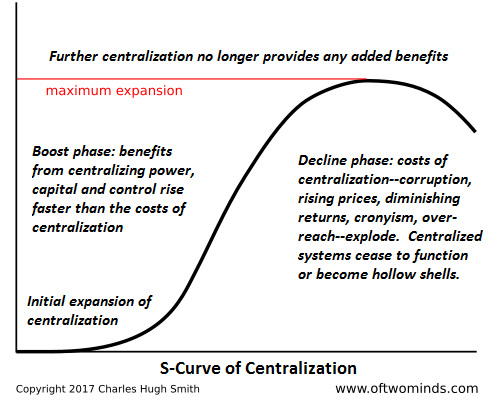When something no longer works, it goes away: it costs more to maintain than its output is worth.
The fragmentation of political consensus (i.e. the consent of the citizenry) is presented by the Powers That Be and their media servants as being a disaster.The implicit fear is real enough: how can we rule the entire nation-empire if it fragments?
As I noted the other day, fragmentation terrifies the Establishment of racketeers and insiders, for when the centrally-enforced rentier skims and scams collapse, those who own and control the rentier skims, scams and rackets will lose the source of their wealth and power.
To understand why fragmentation is the solution rather than the problem, we have to look at how power is leveraged in centralized government. Let's take the recent increase in a common pinworm treatment from $3 to $600:
Pinworm prescription jumps from $3 to up to $600 a pill (via J.F.).
In a top-down, centralized hierarchy of political power (i.e. the central state), the pharmaceutical company only needs to lobby a few authorities in the central state toimpose its rentier skim/scam on the entire nation.
Lobbying/bribing a relative handful of federal officials and elected representatives is remarkably inexpensive: a financier or corporation only needs to focus on these few key players, and smoothing the PR pathway via a highly concentrated corporate media.
A mere $5 million spent in the right places guarantees $100 million in future profits-- profits earned not from open competition in a transparent market, but profits plundered as rentier skims: the product didn't get any better or effective when the price leaped from $3 to $600, and competition was squelched by regulatory capture and high barriers to entry.
Now imagine if the pharmaceutical company had to lobby/bribe officials in each of America's 3,142 counties to impose its rapacious rentier skim on the populace of each county. The lobbying/bribing effort will be orders of magnitude more costly and complex, and the national corporate media is less effective at the local level, where community groups and local media have some influence.
If we look at the source of the 2008 Global Financial Meltdown, we find that the centralization of capital and power were the primary enablers of the meltdown. If the financial system were composed of 1,200 local banks, each of which had to comply with local and state regulations instead of five behemoth banks that had the capital and klout to buy Washington D.C.'s approval of their leverage and shady dealings, some hundreds of the smaller banks might have failed--but the system would have survived.
Those banks that played fast and loose with derivatives and subprime mortgages would have reaped what they had sown and been liquidated. Investors in those banks' bonds and stocks would have been wiped out. Losses would have been taken by those who had taken the risks, bad debts would have been written off and lessons would have been learned.
Instead, the five big banks and a handful of other monstrous financial entities were able to cry, "If you don't save us, we'll take the entire system down with us!" A system that prohibited the concentration of centralized capital and power would never have been in a position to be blackmailed by the Too Big To Fail predatory parasites.
If we want a resilient, flexible, low-cost system, we must replace the centralized system of enforced consent and artificial consensus with a fragmented, transparent one of smaller scaled, competing organizations of governance, capital and enterprise.
The intrinsic limits of a corrupt, inefficient and rigged-to-serve-the-few-at -the-expense- of-the-many centralized pyramid of power and wealth is why centralization is the problem rather than the solution:
Transparent fragmentation is the solution. Only those who will lose their share of the rentier skims, scams and rackets are afraid of history's trajectory away from centralization. When something no longer works, it goes away: it costs more to maintain than its output is worth.
As its defenders tax the system to protect what no longer works (except for them, of course), the slide to oblivion accelerates as the system breaks down under the collective weight of all the skims, scams and rackets benefiting the few at the expense of the many.
If you found value in this content, please join me in seeking solutions by becoming a $1/month patron of my work via patreon.com.
NOTE: Contributions/subscriptions are acknowledged in the order received. Your name and email remain confidential and will not be given to any other individual, company or agency.
Thank you, Robert B. ($100), for your outrageously generous contribution to this site -- I am greatly honored by your steadfast support and readership.
| |
Thank you, Robert T. ($5/month), for your extremely generous subscription to this site -- I am greatly honored by your support and readership.
|
























